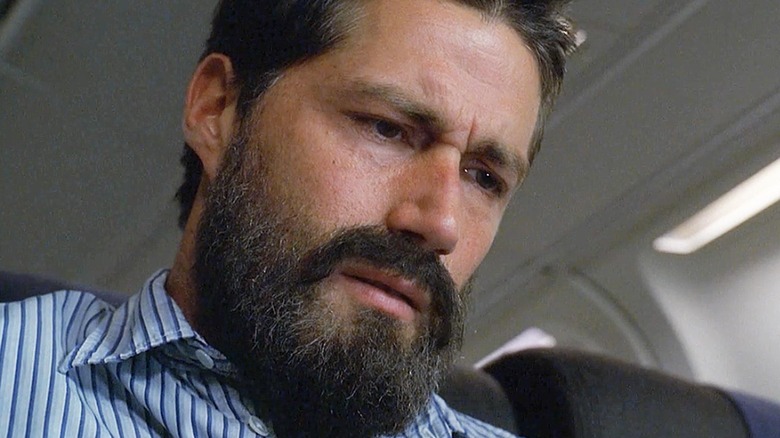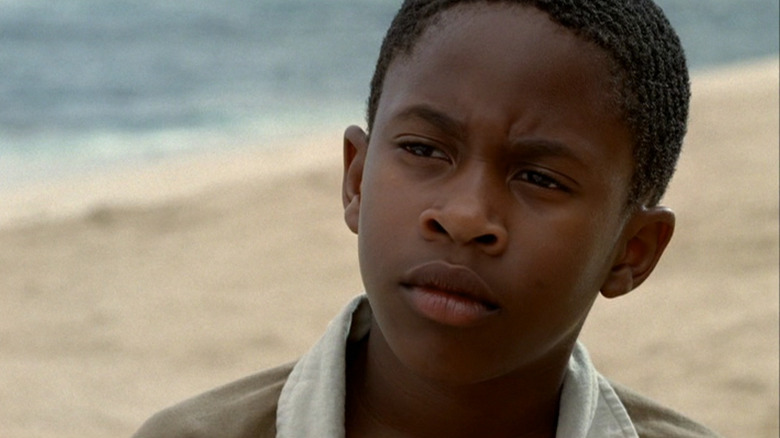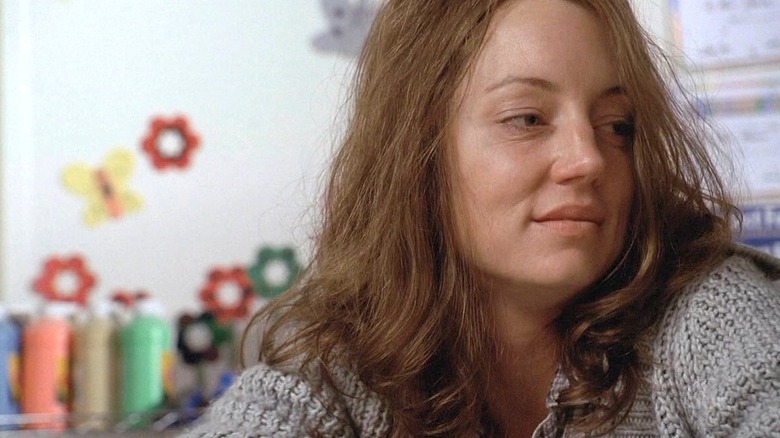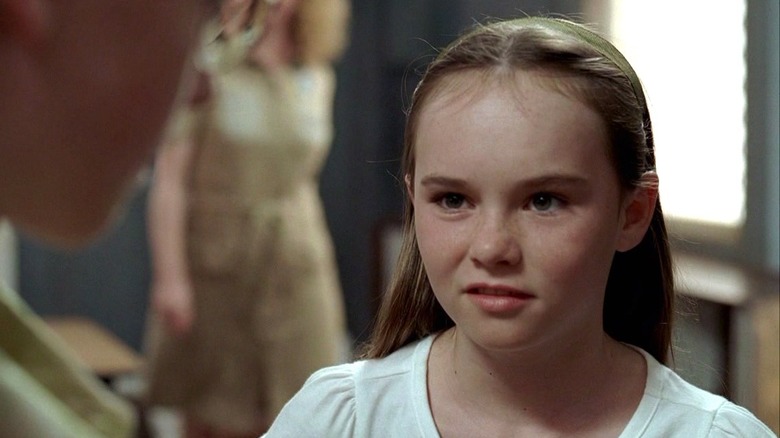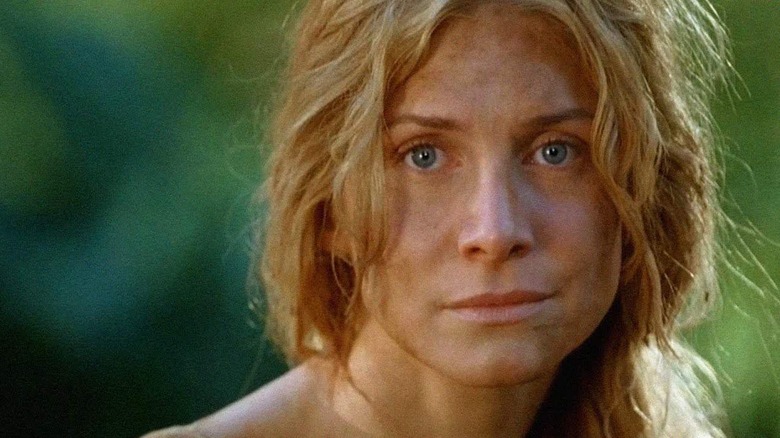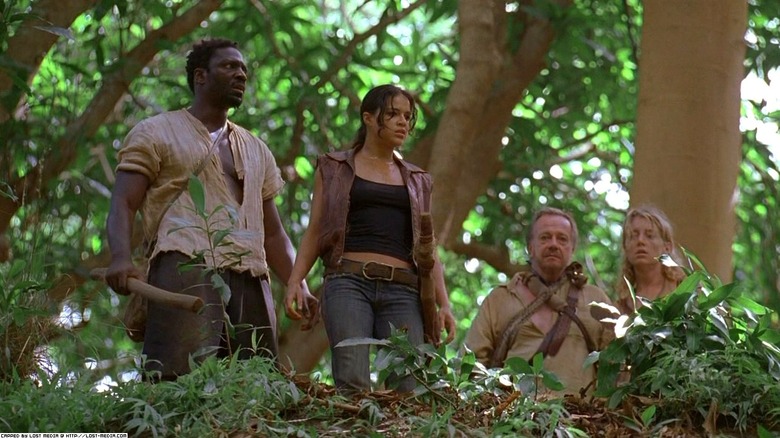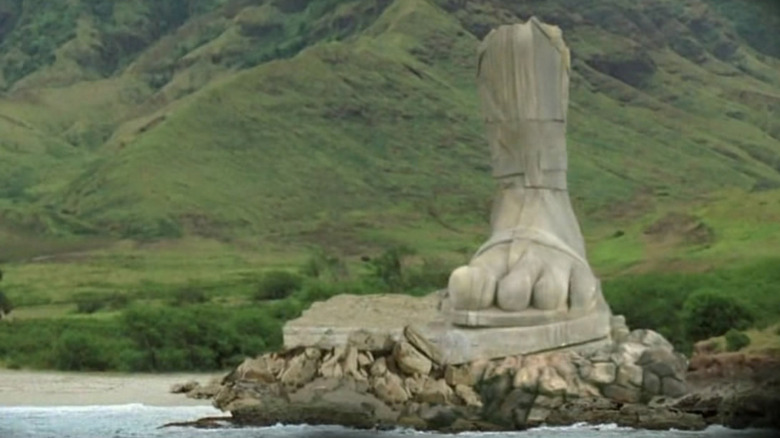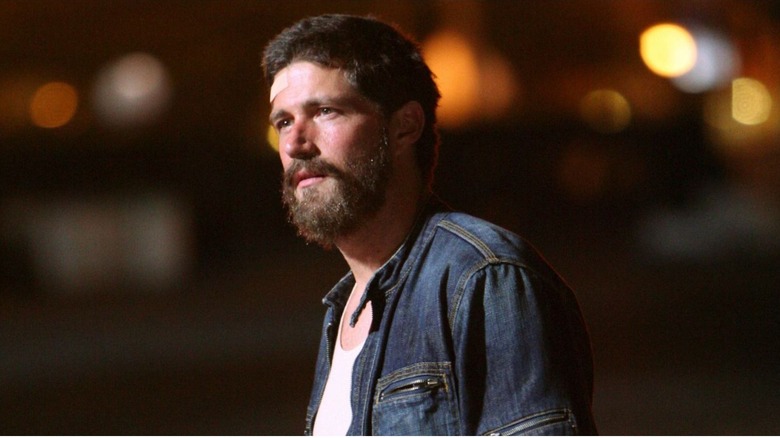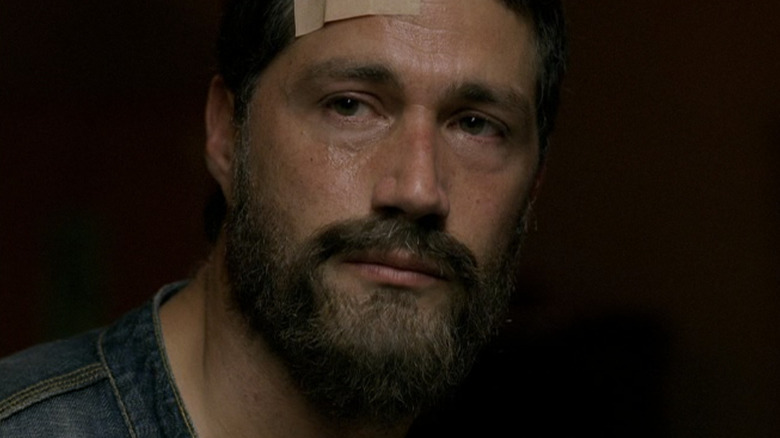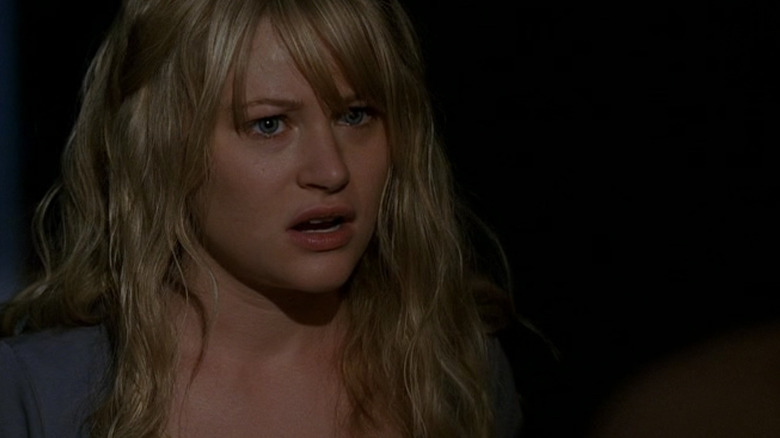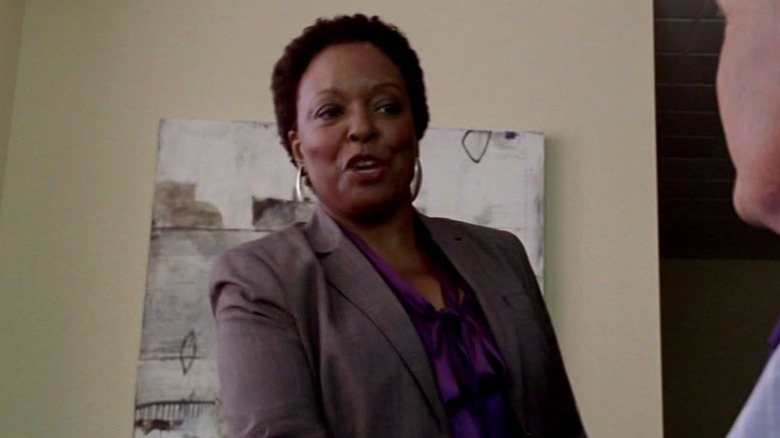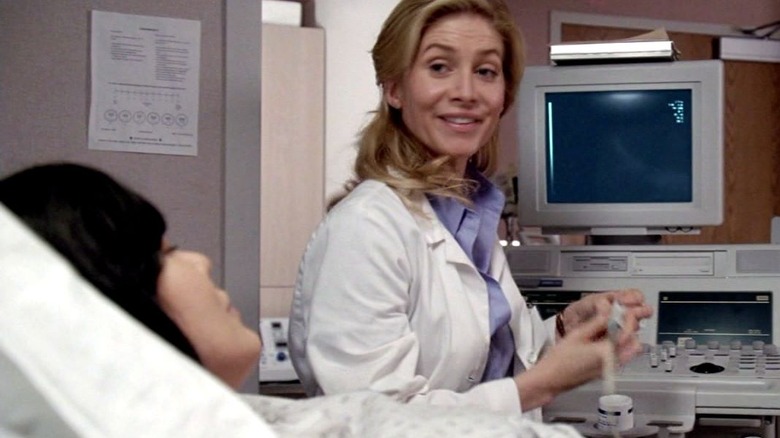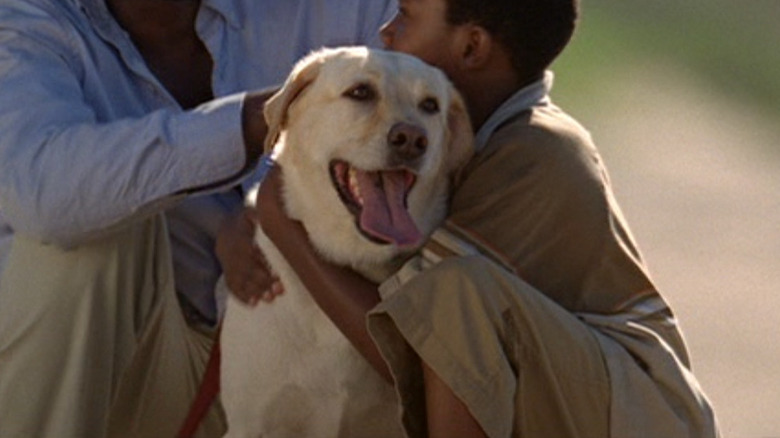Lost Storylines That Disappeared Without Explanation
For once, let's give credit where credit is due. "Lost" — the supernatural TV drama that reduced its fans to blithering obsessives from 2004 to 2010 — neatly tied up and resolved almost all of its seemingly innumerable mysteries. We're dead serious. To this day, cranky ex-viewers behave as through showrunners Carlton Cuse and Damon Lindelof owe them more explanations. But in truth, considering the show's length, dozens of characters, and warping of space and time, "Lost" makes a million times more sense than its critics want to admit.
But wait, you protest, dozens of questions remain in the wake of the series' ending! Sure — and we can answer all of them. What's the significance of the numbers on Hurley's lottery ticket? Well, as "Lost" tells us, the cursed numbers correspond to a specific set of candidates listed in chalk on Jacob's cave wall. What's the deal with Jacob's cabin? Clearly, it isn't Jacob's cabin at all. Whatever its original purpose, it has become the Smoke Monster's cabin by the time the events of "Lost" are underway. Where did the polar bears come from? The Dharma Initiative brought them to the island to conduct kooky experiments. In fact, the answer to a lot of "Lost"-related questions is "the Dharma Initiative did many very dumb experiments."
"Lost" covered most of its bases. But there are a few paths in its labyrinth of plot that do not, in fact, go anywhere. These are the "Lost" storylines that disappeared without explanation.
Walt's superpowers
Arriving when Oceanic Flight 815 crashes on the Island, Walt Lloyd (Malcolm David Kelley) initially seems like he's going to be a major deal. Flashbacks from Season 1's "Special" indicate that Walt possesses psychic powers of some sort — or at least that's why his stepdad says Walt creeps him out. But Walt stops making regular appearances on "Lost" following his kidnapping by the Others at the conclusion of the Season 1 finale, "Exodus." At first, it seems as though the Others take Walt due to their interest in his unspecified specialness. In truth, they grab Walt with the intention of using him to manipulate his father, Michael Dawson (Harold Perrineau), to help them capture their real target, Dr. Jack Shephard (Matthew Fox).
It might be the case that Walt's stepdad isn't genuinely convinced the lad possesses any supernatural abilities. Perhaps Walt's stepdad simply needs to rationalize sending Walt, a 10-year-old who has spent most of his life in Australia, to live with his far-less-wealthy biological father in New York. But then again, Hurley (Jorge Garcia) offers Walt a job in the series epilogue, "The New Man In Charge," which seems to entail freeing spirits trapped on the Island. Maybe Walt actually does possess mysterious abilities? Well, either Walt has superpowers or he doesn't. One of those things is true.
Libby's tenure in a mental institution
Since this is a list of "storylines that disappear," technically, Libby Smith's (Cynthia Watros) tenure at the Santa Rosa Mental Health Institute counts. "Lost" never tells the audience exactly why she's seen there during a flashback in Season 2's "Dave," nor does it give us a clue as to how or why Libby stays at the same facility at the same time as her fellow Oceanic 815 survivor Hugo "Hurley" Reyes.
The show doesn't clobber us over the head with Libby's life story, but if we connect a few dots, a picture takes shape. During a flashback in "Live Together, Die Alone," the Season 2 finale, Libby tells Desmond Hume (Henry Ian Cusick) about her recently deceased husband. The unexpected death of a spouse sounds like precisely the kind of traumatic event that might cause a mental health crisis, doesn't it? Moreover, Libby could be in the same facility as Hurley because, in the fictional world of "Lost," the Santa Rosa area suffers from a shortage of quality, affordable mental health institutions. In fact, Walt is seen doing a stint at that very same institution in "The New Man In Charge." Is this a case of three folks linked by supernatural forces, or of three folks living in the same region of California?
Since "Lost" only indirectly references Libby's grief-related depression, we can safely say this storyline disappeared — even if it's only because there wasn't much more story to tell.
Ben's childhood sweetheart
In Season 3's "The Man Behind the Curtain," the "Lost" faithful finally get a glimpse at the crummy childhood of sometimes-supervillain Ben Linus (Michael Emerson). As it turns out, contrary to what he tells John Locke (Terry O'Quinn) and presumably many other people he wants to impress, Ben was not born on the Island. He was born in Portland, Oregon and came to the Island in the 1970s when the Dharma Initiative gave his abusive dad a job. Annie (Madeline Carroll), one of the other Dharma worker's kids, took a shine to young Ben, providing him with company and friendship during his awkward early Island years. Ben and Annie forged a close bond ... or so it seems.
Presumably, Annie departed the Island in 1977 along with the rest of the women and children shortly before the electromagnetic catastrophe known as the Incident. But we don't know that for sure, because after "The Man Behind the Curtain," Annie is never seen, heard from, or mentioned again. Was Annie originally designed for a larger role? Or is she merely intended as a device to remind the audience that Ben — a murdering, manipulating sociopath as an adult — was once a shy and innocent little boy? In either case, Annie probably isn't the most well thought-out "Lost" character.
Ben's romantic obsession with Juliet
In the flashback portion of Season 4's "The Other Woman," Ben pays a whole heck of a lot of attention to Juliet Burke (Elizabeth Mitchell), the Others' resident fertility expert, upon her arrival on the Island. Community therapist Harper Stanhope (Andrea Roth) explains the fixation by informing Juliet that she "looks just like her," presumably referring to Ben's long-deceased mother. Ben's crush on Juliet goes so psychosauce that when he learns of her affair with Goodwin Stanhope (Brett Cullen), he indirectly arranges for Goodwin's death at the hands of Oceanic 815 survivor Ana Lucia Cortez (Michelle Rodriguez). "You're mine!" Ben hisses at Juliet as she weeps over Goodwin's corpse.
Yet shortly afterward, Ben kind of forgets about Juliet. Granted, the events of Season 3 probably strain his infatuation quite a bit. Aside from the aforementioned flashback, the two of them don't interact much during Season 4. Plus, as of Season 4's conclusion, Ben and Juliet no longer reside in the same decade. Still, after emotionally abusing her for at least three years, you'd expect Ben to be at least a little curious about what becomes of Juliet. Instead, as far as we see, he never mentions her to anybody again.
The Others' heightened aggression towards the tail section survivors
Throughout Season 1, the Oceanic 815 survivors are menaced by the enigmatic Others, who present themselves as the native inhabitants of the Island. The Others' access to modern luxury and technology — and, of course, fake beards — gradually becomes apparent throughout the following two seasons. But as far as Season 1 goes, from what we see, the Others are a simple people who definitely don't argue about the relative merits of Stephen King during their monthly book club.
The group of survivors who sat in the middle section of Oceanic Flight 815 learn of the Others' existence in Season 1's "Raised by Another." Hurley notices Ethan Rom (William Mapother), who's been living among them since the crash, was not actually a passenger on the plane. The Others don't get violent with Jack's camp until after Ethan's cover is blown.
Meanwhile, the survivors who landed on the opposite side of the Island have a very different introduction to the Others. As plays out in Season 2's "The Other 48 Days," the Others ruthlessly attack the group of survivors from the tail section during their first night on the beach. Why do the Others initially take it easy on Jack and his crew, but swiftly brutalize and/or brainwash and absorb just about everybody from Ana Lucia's camp? At least Bernard makes it back to Rose. So, uh, all's well that ends well?
Who built the four-toed statue?
In Season 6's tremendous "Ab Aeterno," we learn that in 1867, a storm swallowed up a slave ship dubbed the Black Rock, which just so happened to carry the individual later known as Richard Alpert. The maelstrom hurled the ship into the Island's massive statue of an Egyptian god. So we find out what the gargantuan foot with four toes, first seen in Season 2's "Live Together, Die Alone," was originally connected to, and we know when and how the rest of the statue was reduced to rubble. But who built the thing — and why?
Can you imagine what kind of person would have the ability to travel to and from the Island and maintain access to the resources and manpower necessary to construct a monument taller than the average city office building? We don't think anybody from the 1800s could pull that off. No sir. That statue must be the handiwork of extraterrestrial aliens from the future. Is there any info in the text of "Lost" to contradict this assertion? We doubt it. That's our story, and we're sticking to it.
Jack's opioid addiction
Sometimes, we want our TV shows to address the sort of issues regular folks encounter. But audiences don't really ask for that from "Lost." "Lost," in turn, dispenses off-the-wall fantasy and adventure that has basically nothing to do with anybody's real life. Most of the time, that's awesome, but this ambivalent approach to reality occasionally turns into a problem. In Hurley's flashbacks and flashforwards, the show handles mental illness as Hollywood usually does: Imperfectly, but with an attempt at respect . The show's take on substance abuse is another matter entirely.
Jack's addiction to prescription pain killers turns him into a weepy, slurring, bearded catastrophe in Season 3 and 4's flashforwards ... then ends the moment the show needs it to. Ben flushes Jack's stash down the toilet, Jack claims he had planned to do the same thing, and suddenly, Jack has a devastating substance abuse problem completely under control, without so much as a twitch of withdrawal symptoms. That's not how opioid addiction works at all. For many sufferers, maintaining daily sobriety is a lifelong battle — it's not a condition that can be switched off the moment it becomes inconvenient.
Jack's substance issues disappear with no explanation, but then again, "Lost" treats addiction more like a prop than a storyline. Not a good look, "Lost."
Jack never says why he thinks Sun blames him for Jin's death
At the conclusion of the Season 4 finale, "There's No Place Like Home," Ben informs Jack that he must return to the Island and convince each member of the Oceanic Six to go back with him. "I don't even know where Sayid is," mumbles a pilled-up Jack. "Hurley is insane. Sun blames me for ... and Kate ... she won't even talk to me anymore."
Jack might as well have finished that sentence regarding Sun-Hwa Kwon (Yunjin Kim), because her husband Jin-Soo Kwon (Daniel Dae Kim) apparently explodes in a freighter earlier that very episode. We don't have to stretch our imaginations to figure out that Jack is referring to this death. However, it becomes wildly obvious in subsequent episodes that Sun doesn't blame Jack for Jin's death at all. She definitely blames Ben — she even plans on murdering Ben at one point. But we never see her say or do anything to indicate she plans to inflict any retributive harm on Jack whatsoever.
It's highly possible that Jack says he thinks Sun blames him for Jin because he's in a deep state of solipsistic self-pity, and, in the moment, basically feels like everyone blames him for everything. But it's still weird that he jumps to that conclusion without much prompting, given that viewers never see evidence of it.
Kate's mysterious dream
Claire Littleton (Emilie de Ravin) miraculously appears in Kate Austen's (Evangeline Lilly) house during a flashforward in "There's No Place Like Home." At this point, the audience hasn't seen Claire since she uncharacteristically followed "Christian Shephard" into the jungle three episodes prior in "Something Nice Back Home." Claire pops up in Aaron's bedroom and demands that Kate not bring him back to the Island. Then, Kate wakes up. Claire — Aaron's biological mother — never actually barges into Kate's house in the middle of the night to make demands about Kate's possible travel plans. It's all a dream.
Perhaps this scene can be summarized as Kate's subconscious mind helpfully telling her to not do what she doesn't want to do anyway: Bring her adopted child to an extremely dangerous island where, in addition to several other tribulations, a handful of folks she knew personally died under violent and often excruciatingly painful circumstances. What we have here is a storyline that disappears with no explanation, unless we accept that the explanation is self-evident. Kate is not an absolute idiot or psycho, therefore, Aaron is not going back to the Island ... we think.
Rose should be a candidate
Season 2's marvelous "S.O.S." reveals that Rose Nadler (L. Scott Caldwell) isn't in any hurry to fly back to the mainland for the same reason Locke doesn't want to go home. The Island, it seems, has cured her cancer, much as it's fixed Locke's back, thus allowing him to resume full use of his legs. Four seasons down the line, we discover that certain individuals on the Island can only be harmed or killed under specific circumstances. That's because these folks have been randomly selected as candidates to replace Jacob (Mark Pellegrino) as the functionally immortal overseer of the Island. Much of Season 6 revolves around Jack, Hurley, Sawyer, Sayid, and the Kwons dealing with the highly volatile conditions that coincide with candidacy.
But if the Island healed Rose's cancer, doesn't that mean she should also be one of Jacob's candidates? And since she's obviously not dead or corrupted by the Smoke Monster, why isn't she clued into her candidacy and brought into the same conversations the aforementioned cluster of potential Island protectors are part of?
There are all kinds of plausible reasons why this is the case. Maybe Jacob knows Rose wouldn't want the gig. Maybe Jacob would have to separate her from Bernard (Sam Anderson), and had no interest in doing so for obvious reasons. Maybe Rose is secretly evil. Would've been nice to find out what the deal with Rose's candidacy is, "Lost."
What's up with the deadly pregnancies?
The Others know that pregnant women who conceive on the Island, along with their babies, never survive the birthing process. As they can leave the Island and return whenever they want, why don't they just send expectant mothers to the mainland to have their babies safely? Moreover, aren't there ways the Others could study this highly bizarre phenomena without essentially murdering so many of their own people?
To account for the logical snags surrounding the Others' fixation on the Island's fatal effects on pregnant women, we need only gesture towards their charismatic and utterly insane cult leader, Ben Linus — who, it just so happens, is the son of a woman who died in childbirth. So all that stuff is happening because Ben is evil and crazy. But it is curious how the show itself never quite spells out the Island's anti-natalist effects. Juliet successfully delivers baby Ethan Goodspeed in 1977, and as far as we know, he was conceived on the Island. Does that mean the electromagnetic explosion oft-referred to as the Incident causes the atmospheric conditions that somehow impact pregnancies? Locke hunts mother boars and their piglets in Season 1 — does whatever is happening only affect humans and polar bears for some reason? The Others never figure out what's going on here, and neither will we.
Vincent never gets a flashback episode
Throughout "Lost," flashbacks dole out hints and revelations about the Oceanic 815 survivors, as well as the many ominous and curious characters pulled into the Island's orbit. Except Vincent. Why the heck doesn't Vincent ever get a flashback?
Surely, we assume, the writing staff pitched multiple ideas for Vincent flashback episodes that were all shot down by somebody in charge. Thus, we resolve that someone needs to move the Island, go back in time, and fire whoever axed a dog-centric "Lost" episode. Did the executives lording over "Lost" not understand how deeply people want to know more about dogs — especially dogs who crash-land on magic islands? One of the most acclaimed superhero comic books of 2013 is mostly about a dog! "Lost" could've been ahead of the curve in sci-fi dog stories! Instead, "Lost" let a tremendous opportunity slip through its fingers.
What was Vincent's life in Australia like before Walt's stepdad adopted him? Does Vincent encounter an ageless Jacob at any point? Is "Lost" all just Vincent's dream? We'll never know ... but maybe that's okay. After all, a little ambiguity never hurt anybody.
